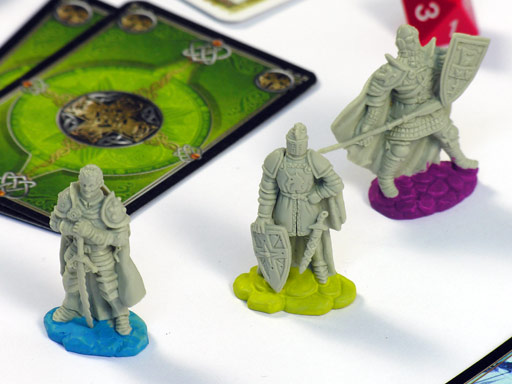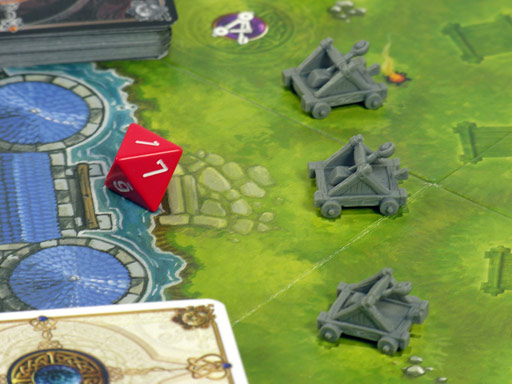
Thankfully, heroic actions are far less intimidating. A knight can travel around the board to the various quest locations as an action, or play one card on a quest they are already working on. Or, if the catapults are getting too numerous, a knight can go forth onto the battlefield in order to destroy them. The quests themselves are pulled straight from the Arthurian legend and require certain combinations of numeric white cards to be played, like two pairs, or a straight. If the quest's victory conditions are met, white swords are earned and placed upon the Round Table. If the black cards have accumulated such that the knight fails, he loses a life point and black swords are placed instead. If seven or more black swords have been placed at any point in the game, the knights lose, but they otherwise manage a victory if twelve swords, a majority of them white, are in play.
I was quite impressed with the game system, which is very flavorful and suitably epic in feel. The artwork, and particularly the miniatures, are impeccable, and simply gorgeous to behold. The components are of very nice quality and feel durable. The cooperative feel is strong; many quests allow for more than one knight to participate, such as Excalibur and the Holy Grail. Others, like defeating the Black Knight in battle, are solo affairs, but even so, the end goal is the same: work together to earn enough white swords to win.

An optional complication, the traitor mechanic, adds a degree of distrust and uncertainty to Shadow Over Camelot that is quite compelling. In this version of the game, loyalty cards, distributed as the game begins, decide a player's allegiance. There is one traitor card in the lot, which means there may or may not be a traitor, even in a seven player game. The traitor secretly works against the other knights, and must balance subtlety with efficiency in order to remain hidden. As the game progresses, knights can accuse one another of treachery. A successful accusation earns a white sword, while an errant one turns a sword from white to black. An exposed traitor is free to wreak havoc, snatching cards from other players' hands on his turn. Though I do not typically enjoy such systems, the traitor adds a mental layer to the game that is delightful.
I was very much impressed by Shadows Over Camelot. The excellent boards and game pieces draw people in, and supporting up to seven players means the whole gang can all play. The game is simple enough to explain, yet deep enough to remain enjoyable after several plays, especially with the inclusion of the traitor. Of all the board games we've covered, Shadows Over Camelot is among the most accessible to non-gamers, which is always a plus. If you are a fan of the Arthurian mythos, and love co-op (and I'm guessing you do), I highly recommend picking up a copy.